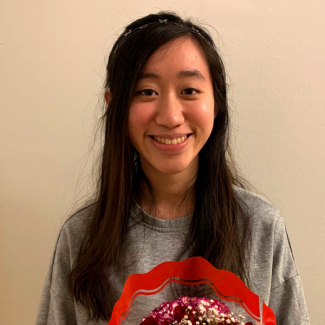Congratulations to the 2020-2021 Winners!
The UTSC Undergraduate Research Prize honours UTSC students who have excelled in research, scholarship and creative activities in the classroom and beyond. This prize recognizes the research and creative activities of undergraduate students, their overall contribution to the University of Toronto Scarborough, and illustrates the role of the library in the research process. The project may take many forms such as a traditional paper, a database, a website, digital project or creative expression.
Winners
Jane Ching Lam Lui, Physical & Environmental Sciences
Rajpreet Sidhu, Centre for Critical Development Studies
Jeffrey Liu, Historical & Cultural Studies

Jane Ching Lam Lui, Physical & Environmental Sciences
Please share a quick description of your research.
My research project involves synthesizing a review article about decoding bacterial adhesion one molecule at a time. The hallmark of this article is its comprehensiveness of different single-molecule techniques and the important biomedical and environmental implications derived from these studies, ranging from medicine to dentistry, agriculture to food safety, heavy industries to the marine environment. Every year, billions of dollars are spent on biofilm-related problems. Given that biofilm is one of the root causes that can escalate into a severe disease, probing bacterial adhesion at a single-molecule level facilitates the mechanistic understanding of biofilm formation, which will guide the development of antifouling coatings and anti-adhesion therapies. From gathering literature articles to articulating my research in a well-constructed manner, this resulted in a successful completion of the review article, which will be published in the journal – Frontiers in Molecular Biosciences.
What are some next steps that you’re looking forward to with your research?
I am currently working as a NSERC-USRA researcher in Professor Ruby Sullan’s lab. In the coming fall, I will be starting my journey as an incoming dental student.

Rajpreet Sidhu, Centre for Critical Development Studies
Please share a quick description of your research.
During the Maoist Civil War, 1300 to 1500 individuals were disappeared by the Nepali state and the Maoist army, while the families of the disappeared are still living without knowing the fate of their family members. Since it is difficult to provide evidence relating to these disappearances, the perpetrators are rarely prosecuted. There has been a lack of coordinated public memorialization processes and a lack of effective transitional justice institutions on the part of the Nepali state on behalf of the victims and their families. In this thesis, I demonstrate how the social media platform Instagram has emerged as an alternative site of memory-making. I conduct a reflective thematic analysis of 28 Instagram posts, utilizing NVivo to understand the curation methods used in the Instagram posts. I also examine how gender, ethnicity, and caste influence how disappeared individuals are memorialized on Instagram. Specifically, I completed 31 textual analyses of the captions and I provide a visual analysis of 57 images from the Instagram posts. My thematic analysis demonstrates how public memorialization on Instagram allows for bottom-up memory-making to occur through the translation of memories from the familial scale to the national collective scale. These posts are published by non-profits, photo collectives, and media, who are sharing the stories of the families and are keeping the memory of the disappeared alive in the public realm through Instagram and decentering the state and international actors. Regarding transitional justice, the families want to know the fate of their disappeared relatives, and there should be the implementation of long-term mental health support and financial compensation at the local level.
What are some next steps that you’re looking forward to with your research?
I am planning to publish my thesis in an undergraduate journal and will share it widely with Nepali newspapers and possibly publish a long-form article. Currently, I am working at a local market garden and will be starting a position with Parks Canada in the visitor use management department.

Jeffrey Liu, Historical & Cultural Studies
Please share a quick description of your research.
I'm a recently graduated student who specialized in History and minored in Global Asian studies. My project, "Confronting Hybridity: The “Eurasian Problem” in Colonial India," was written as apart of HISD14, Dr. William Nelson's seminar course tilted "Biopolitics in Modern Europe". It explores the issue of racial hybridity in the British Raj, analyzing historical sources on colonial anxieties surrounding the plight of the Anglo-Indian population in order to explicate how the presence of "mixed-race" population unsettled colonial power structures and the construction of race.
What are some next steps that you’re looking forward to with your research?
I completed my undergraduate studies in the winter semester, but continue to work as a researcher on the Feeding the City project where I research the effects of the COVID-19 pandemic on Toronto's food system. In the fall, I will commence my JD degree at the University of Toronto's Faculty of Law.
Special mention and thanks to all the applicants and judges!
Learn more about UTSC Undergraduate Research Events and Prizes.